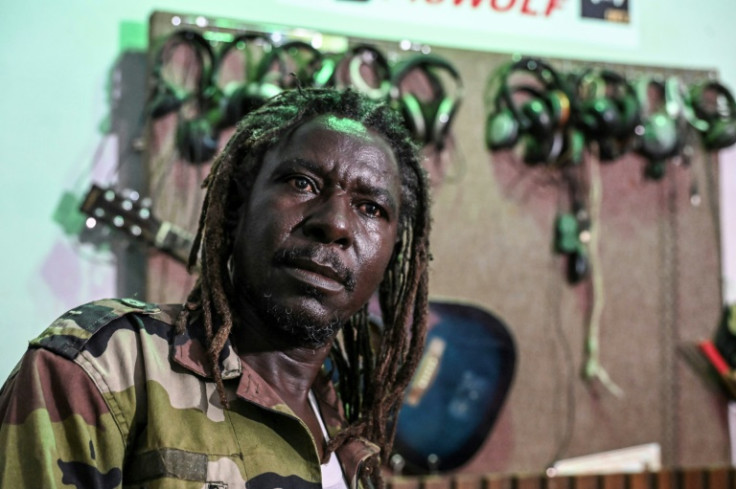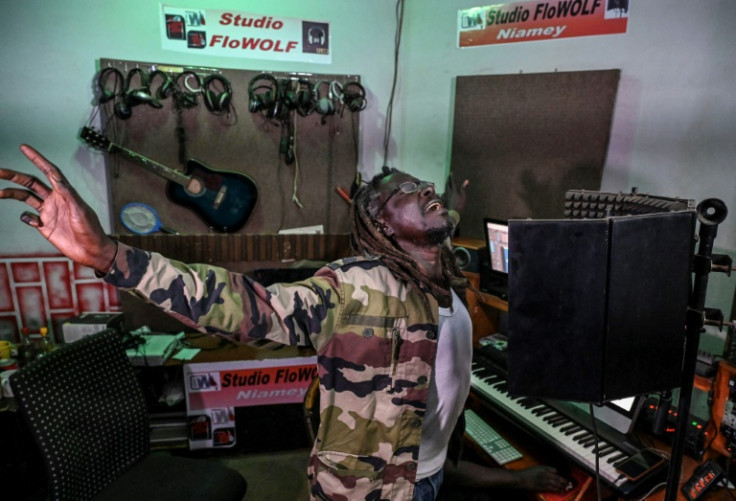Niger Dancing To Tune Of Coup-backing Songs

Amid a crowd gathered in support of Niger's military rulers stands star-of-the-moment Sergeant Maman Sani Maigochi.
In combat dress, he bobs and weaves through a choreographed routine that mixes dance and salutes and the imaginary shooting of a gun.
Niger's coup d'etat on July 26 has been backed by military and civilian musicians who are turning out new tunes to match a surge in patriotic fever.
Maigochi, who learned music after joining the army, has become celebrated for video clips which dominated national TV screens during the first hours of the coup, before the new leadership was established.
The clips rather improbably mix footage from army promotional videos -- soldiers on operations, military parades and medal ceremonies -- with images of the sergeant's swaying hips, against a soundtrack of silky rhythms.
Maigochi's green beret and brilliant smile have since the early 2010s embodied the popularity of the armed forces in a country where 71 percent of Nigeriens said they had "a lot of" trust in the army, according to an Afrobarometer poll from June last year.
On a break in the capital Niamey, a stronghold of the opposition to the ousted regime, Maigochi is recording an umpteenth clip in the gardens of the Oumarou Ganda cultural centre, named after the famed director.
The film set involves a simple camera with a laptop atop a speaker that is belting out his latest song.
Maigochi -- who still goes out on operations to help morale -- is the latest in a long line of artists in public service employment and says he wants to "galvanise" soldiers and civilians with his compositions which integrate classic Nigerien musical sounds.
"The douma, kalangou, gourimi, these traditional instruments, I put them in my music... to enrich it a little because if a Nigerien hears this sort of thing, he likes it, it wakes him up," says the sergeant.
The threat of a military intervention by West African neighbours opposed to the overthrow of a democratically elected governments, has awakened patriotism within a section of the population.
The new national anthem that was launched in June before the government's ouster, is all the rage.
A legion of civilian artists is organising gatherings to support the new regime in major towns across the country and producing their own videos, backed by a wide range of music from traditional to rap and reggae.
"There has been a spontaneous movement from different sections of society to come out and support le coup d'etat," says singer Adamou Yacouba, who goes by the stage name Black Mailer.
Inside a music studio in Niamey, the famous local musician launches into his latest number, as soon as the electricity returns from a long outage.
The dreadlocked rastaman, a mismatch in the nation's traditional conservative and religious society, fittingly sports a military jacket.
"When democracy is privatised soldiers, you have to militarise it," he sings in a syncopated beat.
The scene might appear surprising to foreigners, but not to Nigeriens.
The history of the Sahel nation is scarred by a succession of military regimes and coups which have often brought down unpopular governments.
From Seyni Kountche to Ibrahim Bare, the strongmen and their emergency regimes are remembered well by some Nigeriens who say they feel let down by the political class.
For Rachid Ramane, head of the Federation of Niger's artistic and cultural associations, the emergency regimes have written most of the best official texts overseeing the cultural world.
"It's a way of saying the military listen to us more than the civilians. It's a shame, it's a paradox, but that's how it is," he explains.
But Niger's musicians, military or civilians, do not just deal in flattery.
"Their art is considered a road map for the military," says Black Mailer.
Mailer and others like him do not hesitate to criticise previous regimes, at great risk to themselves.
"All my career has been a series of troubles," he laughs.
In a country where music struggles to throw off society's shackles, art and politics often go hand in hand.
"In Niger's artistic and musical heritage, 80 percent of what's been done is a call for vigilance," says Ramane.
"We are the eyes and ears of those without a voice, and we are going to carry on."




© Copyright AFP 2024. All rights reserved.











